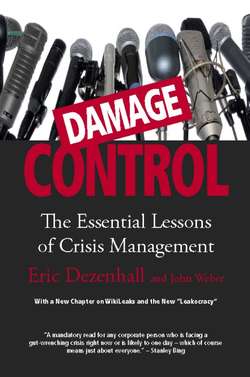Читать книгу Damage Control (Revised & Updated) - Eric Dezenhall - Страница 16
На сайте Литреса книга снята с продажи.
PLAYING THE ODDS RESPONSIBLY
ОглавлениеConsumer product companies are faced with rumors of tampering every day. Sabotage gossip is especially rampant in the Internet Age and since 9/11. The vast majority of these reports turn out to be groundless. If every company recalled its products based on adverse event rumors, there would be no economy for consumer goods. Many times we advise clients to contain recalls discreetly and on a regional basis depending upon the credibility of the report (Internet rumors are notoriously inaccurate) and the severity of the allegation (How seriously could someone be injured?).
Responsible, educated intelligence work and odds-making address most, but not all, crisis scenarios. A company must be prepared to initiate a nation- or worldwide recall immediately, but it is logistically absurd to embrace the “instant” recall canard as the only option for besieged manufacturers.
After initial missteps, Firestone recalled its tires in 2000 and began to rebuild its brand under a new name, Bridgestone. Similarly, after a 1996 plane crash that killed 110 in Florida, ValuJet eventually regained trust by resolving what caused the crash, merging with another airline, and rebuilding under its new name, AirTran. Even ImClone, hit by the Martha Stewart torpedo, has begun to emerge from stormy seas—despite its imprisoned founder—by proving that its once-scorned cancer drug is effective after all.
One outcome that is rarely included in Tylenol lionizations is the protracted litigation between the victims’ families and J&J. Eight years after the murders, J&J settled with the families for an undisclosed sum, according to O’Dwyer, “just as jury selection was to start in Cook County.” That this escaped public scrutiny is a testament to J&J’s damage control, management recognizing when it was time to take a deep breath and cut a check.
We’ve known executives who, at many companies that didn’t enjoy the outcome that J&J did, beat themselves up, wondering what they did wrong. While self-criticism is healthy, the Tylenol dogma has done a disservice to enterprises trying to grapple with crisis management.
The Tylenol crisis taught us good things that responsible companies can do when confronted by murderers. While a quarter century of hindsight may suggest that J&J should have recalled the Tylenol capsules immediately and ceased their production, Monday morning quarterbacks must remember that crisis management by its very nature is about making good decisions, not perfect ones. J&J did most of the right things in a messy world littered with incomplete information.
Perhaps the true genius of the Tylenol crisis lies both in its merchandizing as well as in its actual handling. As media and business pundits proliferate, the two may prove to be equally important.
